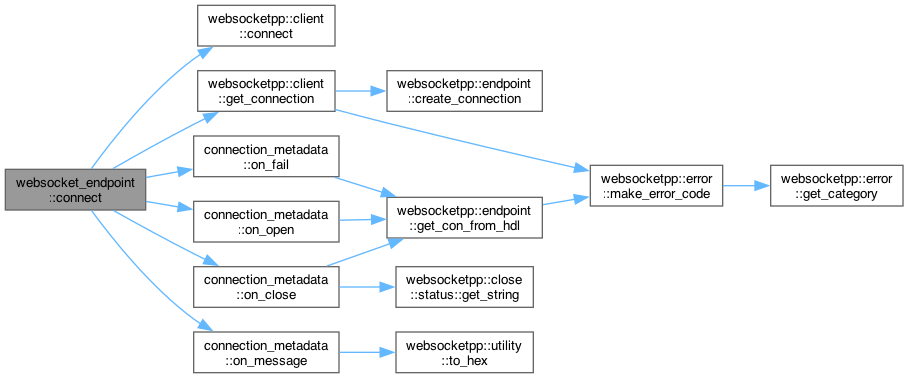Detailed Description
Definition at line 113 of file scratch_client.cpp.
Constructor & Destructor Documentation
◆ websocket_endpoint() [1/6]
|
inline |
Definition at line 115 of file scratch_client.cpp.

◆ ~websocket_endpoint() [1/4]
|
inline |
Definition at line 125 of file scratch_client.cpp.

◆ websocket_endpoint() [2/6]
|
inline |
Definition at line 134 of file utility_client.cpp.

◆ ~websocket_endpoint() [2/4]
|
inline |
Definition at line 144 of file utility_client.cpp.

◆ websocket_endpoint() [3/6]
|
inline |
◆ websocket_endpoint() [4/6]
|
inline |
◆ websocket_endpoint() [5/6]
|
inline |
◆ ~websocket_endpoint() [3/4]
|
inline |
Definition at line 125 of file step5.cpp.

◆ websocket_endpoint() [6/6]
|
inline |
◆ ~websocket_endpoint() [4/4]
|
inline |
Definition at line 144 of file step6.cpp.

Member Function Documentation
◆ close() [1/4]
|
inline |
Definition at line 185 of file scratch_client.cpp.


◆ close() [2/4]
|
inline |
Definition at line 210 of file utility_client.cpp.

◆ close() [3/4]
|
inline |
Definition at line 185 of file step5.cpp.

◆ close() [4/4]
|
inline |
Definition at line 210 of file step6.cpp.

◆ connect() [1/5]
|
inline |
Definition at line 147 of file scratch_client.cpp.


◆ connect() [2/5]
|
inline |
Definition at line 166 of file utility_client.cpp.

◆ connect() [3/5]
|
inline |
Definition at line 103 of file step4.cpp.

◆ connect() [4/5]
|
inline |
Definition at line 147 of file step5.cpp.

◆ connect() [5/5]
|
inline |
Definition at line 166 of file step6.cpp.

◆ get_metadata() [1/5]
|
inline |
Definition at line 200 of file scratch_client.cpp.

◆ get_metadata() [2/5]
|
inline |
Definition at line 243 of file utility_client.cpp.
◆ get_metadata() [3/5]
|
inline |
◆ get_metadata() [4/5]
|
inline |
◆ get_metadata() [5/5]
|
inline |
◆ send() [1/2]
|
inline |
Definition at line 225 of file utility_client.cpp.


◆ send() [2/2]
|
inline |
Definition at line 225 of file step6.cpp.

The documentation for this class was generated from the following files:
- libraries/fc/vendor/websocketpp/examples/scratch_client/scratch_client.cpp
- libraries/fc/vendor/websocketpp/examples/utility_client/utility_client.cpp
- libraries/fc/vendor/websocketpp/tutorials/utility_client/step4.cpp
- libraries/fc/vendor/websocketpp/tutorials/utility_client/step5.cpp
- libraries/fc/vendor/websocketpp/tutorials/utility_client/step6.cpp
- libraries/fc/vendor/websocketpp/tutorials/utility_client/step3.cpp